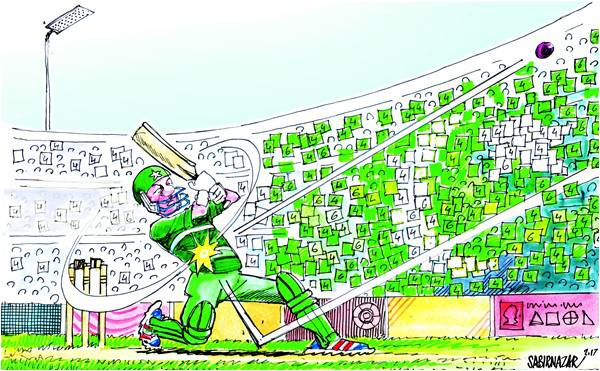
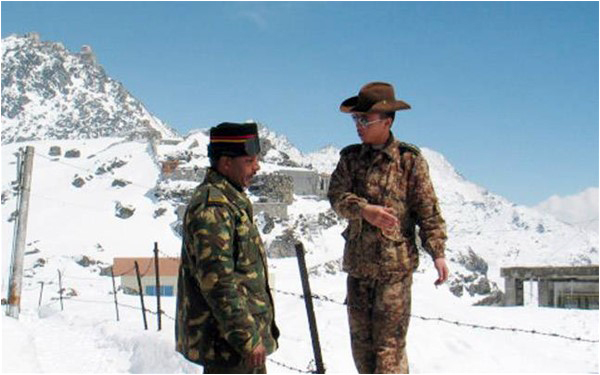
China-India standoff
Sir,
India’s belligerent attitude and hegemonic tendencies has, as usual, motivated it to flex its muscles against one of its neighbours once again. But this time it has picked a row with a gigantic and very powerful neighbor: China. For the past month or so, the Indian troops have been engaged in infiltrating the Chinese territory of Doklam with ulterior motives and instigating the Chinese forces to retaliate.
In the wake of India’s continuous trespassing of the Chinese territory of Doklam and challenging the patience of the Chinese forces, the Chinese defense ministry issued a stern warning to India and reiterated its call for immediate withdrawal of Indian troops from the Doklam plateau. The Chinese defense ministry said that Beijing will determinedly safeguard the territorial sovereignty and security interests of the country. The Chinese defense ministry spokesperson, Ren Guoqiang, further said that, “no country should underestimate the Chinese forces’ confidence and capability to safeguard peace and their resolve and willpower to defend national sovereignty, security and development interests”.
The Chinese foreign ministry spokesman emphasized that the border in Sikkim had been settled in an 1890 agreement with the British, and that India’s violation of this agreement was “very serious”. Indian Security analyst Jaideep Saikia told the BBC that Beijing had, for a while now, been trying to deal directly with Thimphu, which is Delhi’s closest ally in South Asia. “By raising the issue of Bhutan’s sovereignty, they are trying to force Thimphu to turn to Beijing the way Nepal has,” he said.
Claims and counter-claims, allegations and counter-allegations by both sides may or may not be so important, but what is very important is for both sides to appreciate the gravity of the situation and try and resolve the issue amicably. If India continues to be adamant and does not respond positively to the Chinese demand for instant withdrawal of its troops from Doklam, it must be prepared to face the consequences that would be dreadful and could have devastating impact not only on India but also other countries of the region. One may recall that the region saw clashes between China and India in 1967. However, the latest development that has cropped up between the two Asian giants appears to be one of the most serious escalations in recent years. One only hopes India would act rationally, withdraw its troops from Doklam forthwith, and save not only itself but the entire region from an impending catastrophe.
Fazal Elahi,
Islamabad.
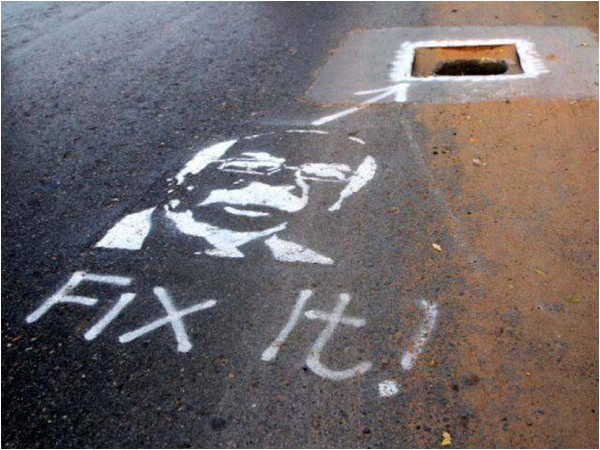
Karachi roads
Sir,
Almost all of the roads in Karachi are ruined badly. The situation has become serious and these roads cause many accidents; and sometimes, extensive damage to our vehicles. There are no checks and balances on the people who are supposed to manage them. Citizens and residents of this city pay taxes on a regular basis and deserve better roads, or at least roads that are good enough to drive on.
The recent monsoon rains made the roads worse than they were before because there is no proper drainage system. It should come as no surprise to find that a poor drainage system results in flooding and that it in turn results in damage to those roads. And when your drainage system fails, people cannot even travel from one place to another without encountering extreme difficulty.
The residents of Karachi, or the entire country for that matter, deserve better than what they are getting. The whole transport system is so badly affected by the poor condition of the roads. The government and authorities are requested to take necessary action.
Faisal Gul,
Karachi.
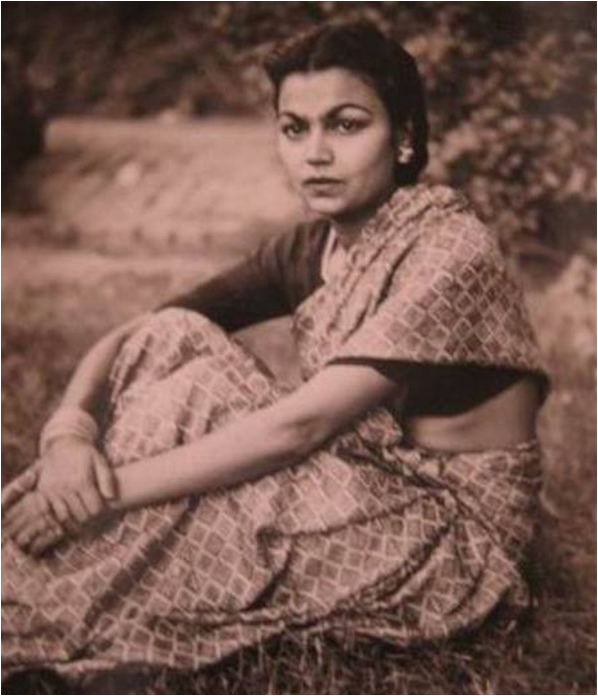
Hajra Masroor
Sir,
September 15 marks the death anniversary of prominent fiction writer Hajra Masroor. With her passing, an era of Urdu’s Bronte sisters came to an end. Hajra Masroor (January 17, 1929 - September 15, 2012) and her elder sister Khadija Masroor (December 17, 1927 – July 25, 1982) were prolific writers; both started writing stories for children in their early teens.
In the 1940s, they moved up to the higher league. Their short stories received acclaim in Urdu circles, and both sisters became the rising stars on the horizon of Urdu fiction. The brilliance of their work enabled the two to join the ranks of Ismat Chughtai and Qurratulain Hyder. Over the next four decades the sisters went on to produce a number of literary masterpieces. Khadija wrote novels Aangan and Zameen and short stories Bochar, Khael, and Chand Rooz Aaur. And, Hajra’s imagination yielded powerful short stories such as Teesrey Manzil, Undahray Ujalay, Charkhaay, Chorey Chupay, Chand key Doosrey Taruf, and Hai Allah.
According to Ahmed Nadeem Qasmi, Hajra Masroor was born in Lucknow, British India, in 1929 (some of her biographers cite 1930 as her year of birth). Hajra’s father Dr. Zahoor Ahmed Khan was a doctor in the British army. In 1937, when Hajra was eight years old, her father died of a heart attack. The loss of her father left young Hajra devastated and emotionally shattered. Recalling those days, Ahmed Nadeem Qasmi, her mentor and a close friend, in his biographical sketch of Hajra Masroor in Naqoosh (January 1956) had observed, “When her father passed away…suddenly her prosperous middle-class family was left in a desert of solitude. In her household there was only one male member - her five-year-old brother Tauseef… when her relatives abandoned them…Hajra’s mother took the family to her father’s house in Lucknow… her trials and tribulations made her a very sensitive person. Her innocent dreams were shattered…”
In October 1947, Hajra’s family migrated to Pakistan; traveling from Lucknow to Lahore via Bombay and Karachi. In 1948, Hajra and Khadija actively participated in the Progressive Writers’ Movement, and were often ridiculed for their progressive outlook and ideas by the male writers. In the 1950s, Hajra and Ahmed Nadeem Qasmi co-edited the prominent Urdu literary magazine Naqoosh.
In the early 1950s, Hajra married Ahmed Ali Khan, then the assistant editor of Pakistan Times, who later became the editor of Dawn. The couple had two daughters. After her husband’s death in 2007, she became a recluse and stopped writing and producing intellectual work.
Hajra Masroor was passionate about bringing social change in society; she zealously wrote about social equity of women. She received a number of awards for her intellectual work including a Pride of Performance (1995) for best writer, Nigar award for best script writer and Alami Faroogh-e-Urdu award for promotion of Urdu language.
Hajra Masroor was a perfectionist; while authoring stories she would revise her script many times to improve it; she was seldom satisfied with her writing, and she would often say “Baat naheiN baney.” She was also an avid reader. She loved music too, but in her early married life, she was reluctant to buy a radio, as it would deny her time to read.
Urdu literature readers will miss their simple but elegant style of storytelling. Au revoir! Hajra Masroor, future generations will read your stories and will praise your uncompromising boldness. (Photo Courtesy: Rashid Ashraf)
Vintage Pakistan,
Facebook.
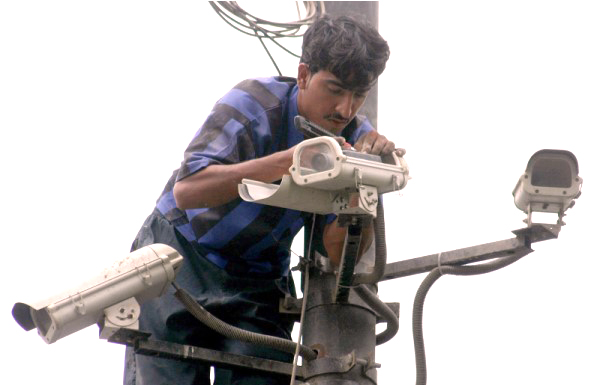
CCTV cameras
Sir,
Mobile phone snatching and bank robbery cases take place regularly In Karachi and their CCTV footage are shared on Facebook and WhatsApp. This footage shows blurred faces of snatchers and robbers. Their motorcycles are also visible but their number plates are not visible.
If high-definition CCTV cameras were installed on our streets it will be easier to identify the snatchers and robbers and the number plates of their bikes. However, I am sure that the Sindh government will not do anything of the kind. The State Bank of Pakistan was able to order all private banks to install high-definition CCTV cameras which can render faces recognizable. A Safe City Project is very important for Karachi just like the one in Islamabad.
Sadly, though, even if these petty criminals are caught, they are out on bail or released soon after and are back on the streets.
Mubashir Mahmood.
Karachi.
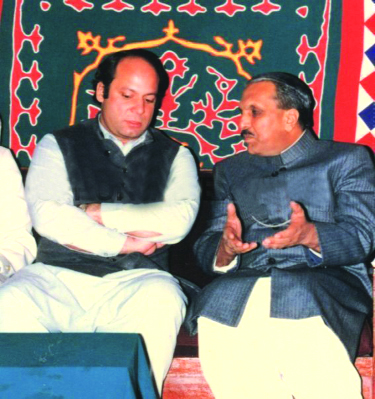
So shall you reap
Sir,
This refers to the outbursts of PML-N leaders when it comes to making statements about the disqualified ex-prime minster Mian Nawaz Sharif, dubbing the Supreme Court verdict of July 28 a “conspiracy”. The PML-N leadership has been shown the mirror. It seems that they have forgotten their own history, which was equally “conspiratorial” right from the day they stepped into politics.
Their ingress into the power corridors was a well-planned conspiracy of the ruling generals at that time. Out of nowhere, a businessman with no political background or political upbringing was made finance minister of Punjab and finally landed in Chief Minister House through non-party elections which all major political parties boycotted.
When Gen Zia ul Haq disposed of his handpicked prime minister Muhammad Khan Junejo, a man of integrity and honesty, they conspired to grab the position of president of the Pakistan Muslim League, of which Mr. Junejo was president. This is how the people of Pakistan got the name PML-N.
The story doesn’t end here; a grand alliance was formed in the name of Islami Jamhoori Ittehad (IJI), with the compliance of the establishment to block the entry of the daughter of the East to the corridors of power. But the people of Pakistan, regardless of all the government machinery backing the IJI overwhelmingly voted in favor of BB.
The conspirators didn’t stop there. They brought a no-confidence motion with the code name “Operation Midnight Jackal” in the National Assembly to topple the democratically elected government of the PPP. The nation has not forgotten the (in)famous “Changa Manga” episode in which sitting MNAs were hauled up and offered lucrative incentives even in the form of cash. Upon failing to dislodge BB’s government, the abettors and conspirators, with the blessings and benediction of then president Ghulam Ishaq Khan had her government dismissed under Section 58 (2)b, twice on fabricated, false and forged charges of corruption and incompetence.
The PPP invented the famous slogan “Ya Allah, Ya Rasool, Benazir be-Qassoor” to which the PML-N forcefully objected and tried to incite, instigate and provoke the religious sentiments of the public. The hypocrisy is that they are using the same phrase for their ousted leader today.
The nation has not forgotten the day when the Supreme Court of Pakistan was attacked by MNAs and workers of the ruling PML-N, when the honorable judges of the highest court were hearing a contempt of court case against Mian Nawaz Sharif.
It didn’t end there. A conspiracy was engineered to divide the Supreme Court and make the honorable judges revolt against the chief justice, Justice Sajjad Ali Shah. History is also witness to an unparalleled conspiracy when the serving army chief’s plane was refused permission to land on the soil of the country of which he was under oath to safeguard it from all external and internal threats. And instead of that it was ordered to land in enemy territory.
There is a long list of conspiracies hatched by those who are now calling the unanimous verdict of five judges of the Supreme Court one. Muhammad Khan Junejo was unceremoniously, informally, irregularly and forcefully removed as president of the Muslim League. Today MNS has been forced to vacate the position as head of the PML-N and is left with no choice but to hand over the reins of his party to his younger brother. As the saying goes, “As ye shall sow, so shall ye reap.”
It isn’t too late for the leadership of the PML-N to emerge from this mindset according to which they think that someone is conspiring against them. Instead of wasting their time and energy in fabricating and developing conspiracy theories they must put their energy into the voter and strengthen the democratic process.
Aamir Aqil,
Lahore.
Ikebana recycling
Sir,
Artist Sohail Zuberi recently showed the Ikebana group in Karachi how we can use natural materials to prevent environmental pollution. He converted plastic bags into items for daily use. Wind chimes and salad spoons emerged from sea shells and wood. He made braided rope with the tough fibers of dried umbrella palm sticks. The rope can be used as handles for bags or as part of Ikebana.
Khan,
Karachi.
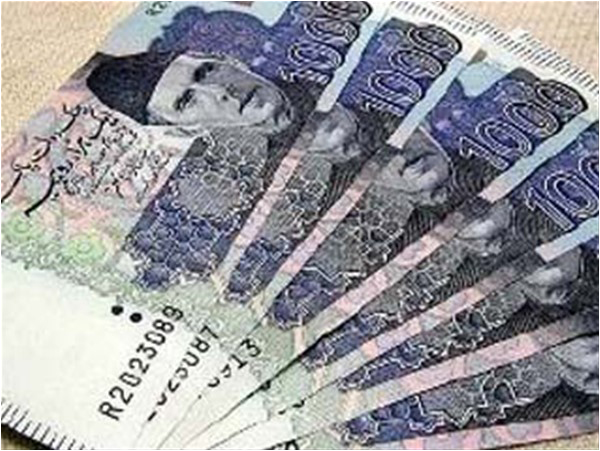
Unfair exchange
Sir,
I wish to draw the attention of the State Bank to the fact that MCB has its own unfair and lower exchange rate for dollars received from abroad. On August 9, for instance, the exchange rate according to the State Bank website (and those of other banks) was Rs105.39, but MCB was giving only Rs103.30. A person receiving a thousand dollars on the said date would receive Rs2,000 less than if the money had come to any other bank. The question is, why is MCB indulging in this blatant injustice? Why would anyone want to remit precious foreign exchange to someone with an MCB account? The State Bank should look into this matter and direct MCB to exchange dollars at the rate specified by on its website at the time.
Shakir Lakhani,
Karachi.

Antibacterial soaps
Sir,
Some antibacterial soaps may promote tumor growth, scientists have found. According to a study in Proceedings of the National Academy of Sciences, researchers found that triclosan, one of the most common antimicrobial chemicals in products from detergents to cosmetics, can be dangerous when it comes to allergies in children, breast cancer and thyroid dysfunction and weight gain.
Mice exposed to triclosan regularly for six months showed abnormal cell growth, liver fibrosis, and inflammation. Triclosan is regulated in many countries, but not in Pakistan.
The chemical is found an estimated 75 percent of antimicrobial soaps and body washes. Remember to always refer to product labels to determine whether triclosan is contained in your product. Some soaps may use triclosan’s cousin, triclocarban, in place of triclosan.
Dr K. A. Fatah,
Sahiwal.

